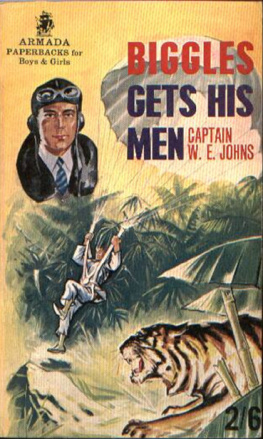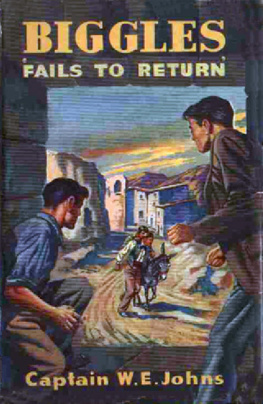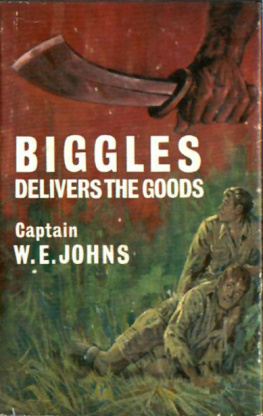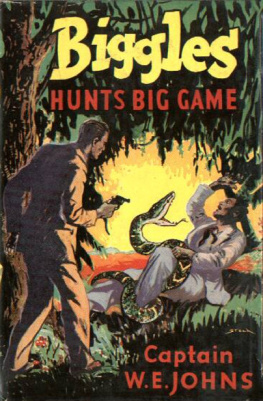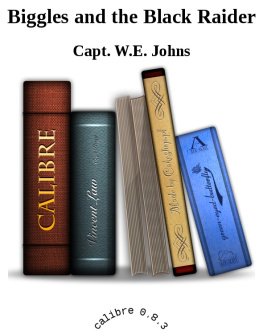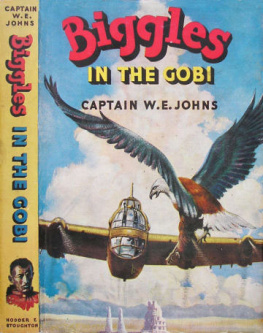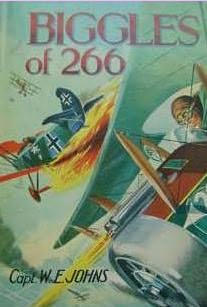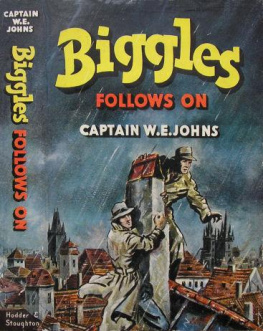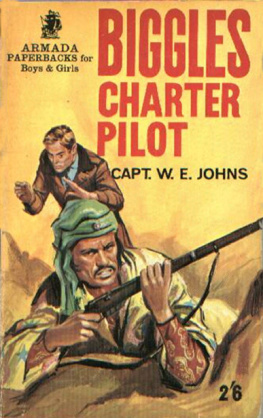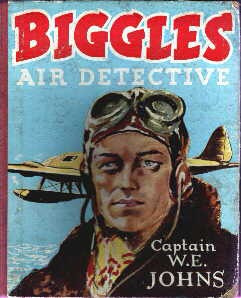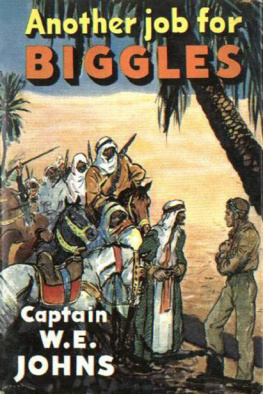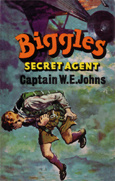Captain W.E. Johns - Biggles Gets His Men
Here you can read online Captain W.E. Johns - Biggles Gets His Men full text of the book (entire story) in english for free. Download pdf and epub, get meaning, cover and reviews about this ebook. year: 1950, publisher: Hodder and Stoughton, genre: Detective and thriller. Description of the work, (preface) as well as reviews are available. Best literature library LitArk.com created for fans of good reading and offers a wide selection of genres:
Romance novel
Science fiction
Adventure
Detective
Science
History
Home and family
Prose
Art
Politics
Computer
Non-fiction
Religion
Business
Children
Humor
Choose a favorite category and find really read worthwhile books. Enjoy immersion in the world of imagination, feel the emotions of the characters or learn something new for yourself, make an fascinating discovery.
- Book:Biggles Gets His Men
- Author:
- Publisher:Hodder and Stoughton
- Genre:
- Year:1950
- Rating:5 / 5
- Favourites:Add to favourites
- Your mark:
- 100
- 1
- 2
- 3
- 4
- 5
Biggles Gets His Men: summary, description and annotation
We offer to read an annotation, description, summary or preface (depends on what the author of the book "Biggles Gets His Men" wrote himself). If you haven't found the necessary information about the book — write in the comments, we will try to find it.
Biggles Gets His Men — read online for free the complete book (whole text) full work
Below is the text of the book, divided by pages. System saving the place of the last page read, allows you to conveniently read the book "Biggles Gets His Men" online for free, without having to search again every time where you left off. Put a bookmark, and you can go to the page where you finished reading at any time.
Font size:
Interval:
Bookmark:

RAYMOND STATES THE CASE
FOR some time the only sound heard in the drab headquarters of the Special Air Service, New Scotland Yard, was the sombre ticking of a white-faced clock as it numbered the seconds with dreary monotony and dropped them into the past. Sergeant Bigglesworth, one time Squadron-Leader Bigglesworth, D.S.O., R.A.F., better known as
"Biggles", leaned back in a tilted chair reading the current issue of Flight. Air-Constable
"Ginger" Hebblethwaite, hands in pockets, stared moodily across the depressing panorama of wet roofs which the window overlooked. Air-Constables Algy Lacey and Bertie Lissie, in attitudes of bored indifference, idly turned the pages of the daily papers.
At length Ginger yawned audibly, and turning, remarked: "You know, this place gets more and more like a dentist's waiting-room."
No one answered.
Ginger tried another angle. Looking at his chief, he inquired: "Have you no idea at all of what's in the wind?"
"None whatever," answered Biggles, without looking up. "But," he added as an afterthought, "if Air-Commodore Raymond's face is anything to go by it's something unusually grim."
"He's had something on his mind for a week," put in Algy. "I've met him two or three times and he couldn't even say good morning. In fact, I don't think he noticed me."
"There have been a lot of people in and out of his office," volunteered Bertie. "Foreign Office messengers and official-looking blokes with their little black bags, and all that sort of thingif you see what I mean?"
Biggles closed his magazine, tossed it on the desk and looked at his watch. "Well, I fancy we shall soon know what it's all about," he averred. "
My orders were to report to the conference-room at eleven o'clock. It's nearly that now."
"What about us?" inquired Ginger.
"The Air-Commodore said I'd better take you down as it would save me the trouble of telling you all about it afterwards," replied Biggles, stubbing his cigarette in the ashtray.
"We may as well be drifting along." He got up, and leaving the others to follow went out into the corridor.
After a walk of some distance he stopped before a door conspicuously marked Private, and knocked. A voice called, "Come in." Followed by the others, he obeyed.
There were five men in the long, plainly furnished room, standing together by the fireplace talking in low tones. One was Air-Commodore Raymond, Assistant-Commissioner of Police, and official head of the Air Section. Three were elderly men of similar type. They were unknown to Biggles, although the faces of two were vaguely familiar.
The fifth man was different, being a good deal younger, and thinner, as if he had led a more active life.
"Come in, Bigglesworth," requested the Air-Commodore quietly. "Let me introduce you.
This is Lord Rutterton of the Foreign Office... this is Mr. Lucas Wetherton of the Diplomatic Service... Colonel George Grimster, of the Canadian Army, and"here he indicated the youngest member of the party"Captain Roderick Mayne?' Turning to the first-named, the Air-Commodore concluded: "This is Bigglesworth sir, the officer I spoke to you about."
"I've heard that name," answered Lord Rutterton, in a deep sonorous voice that made Ginger jump. His eyes were on Biggles' face. "Well, now that we're all here, let's get on,"
he added curtly. "We may as well sit down."
"Will you state the case, sir?" inquired the Air-Commodore, as chairs were being taken round the central table.
"Nono," was the quick answer. "You start, Raymond.
I may have a few words to say later."
Biggles' eyes went to the map case that occupied the entire side of one wall. He observed that the area exposed was Eastern Asia.
Lord Rutterton must have guessed what was passing in Biggles' mind, for he remarked, dryly. "Yes, that's the part of the world with which we are concernedvery concerned.
Carry on, Raymond."
The Air-Commodore cleared his throat, and looking at Biggles began in a voice pitched so low, and with such earnestness, that the gravity of the situationwhatever it might bewas at once apparent. "Often, in asking you to undertake a mission, I have prefaced my narration by asserting that the particular case under review was of an importance that could hardly be exaggerated. All these, however, were trivial when compared with the one now before us."
"And it's top secret," boomed Lord Rutterton. "You understand that?"
"Of course, sir," answered Biggles.
"Good. Go on, Raymond," requested the peer.
The Air-Commodore continued. "Our case, although we did not know it at the time, began in March of this year. At that date, and for some years previous to it, there had been in the service of the Government a scientist named Professor Felix Lampeter. It is unlikely that you would have heard of him because, like so many men engaged in his class of work, he detested publicity." The Air-Commodore dropped his voice a tone. "As a matter of fact, Professor Lampeter was one of our leading experts on atomic research.
He lived, very quietly, at Oxford. It was his habit after dinner to take a short walk for exercise along the river bank. On the evening of March 7th he went for his walk as usual.
He did not come back. He never has come back. But we know that when he went out he had every intention of coming back because he gave instructions to his housekeeper that coffee and sandwiches were to be taken to his laboratory at eleven-thirty because he would be working late. It was only when these refreshments were taken to the laboratory that his absence was discovered. A good deal of rain had fallen and the river was high; it was a dark night, so the natural assumption, as suicide could be ruled out, was that he had fallen in the river and so met his death. There was no reason to suspect foul play. His loss
was a serious blow to the department for which he was working. So much for Professor Lampeter." The Air-Commodore paused for a moment.
"Working for us in a similar capacity," he continued. "but specialising in remote control of rocket missiles, was a Doctor Otto Kern, an Austrian refugee who had taken out naturalisation papers and made his home in this country during the Nazi regime in Central Europe. He lived, apparently quite happily, at one of our research stations on the coast, journeying from time to time to London to make his report to the Defence Council.
His only recreation was the sailing of a small boat which he kept in a cove near his home.
On April 22nd he went out for a sailto clear his brain with some fresh air, as he told his servant. He did not return. Neither he, nor his boat, has been seen since, although a few days later his cap was washed up some miles farther along the shore. Apparently he had met with a misadventure, although as he was an experienced sailor, and the sea was fairly calm at the time, it was not easy to understand how an accident could happen.
Anyway, that was blow number two. Then, to cap this sequence of tragedies, in May, Squadron-Leader Kerr-Watson, our supersonic aircraft designer, disappeared in somewhat similar circumstances. He was a married man who lived with his family in a small house not far from the Experimental Establishment at Farnborough. He left his home as usual after breakfast, and took, as was his habit, a short cut across the fields to the aerodrome. His wife saw him go. He was in good spirits because he had just completed an experimental job on which he had been working for months, and was confident of its success. He never arrived at the airfield. What happened to him we don't know, but whatever it was, it was something for which he was not prepared when he left his home. Naturally, in the light of this third disappearance we had to take a different view of the earlier tragedies. What was happening to these men? Could this be a coincidence? It seemed unlikely. It began to look as if a sinister plot was afoot. Who were the instigators? What was their object? If it was to deprive us of our leading technical experts, why did they not murder these men and have done with it? The alternative theory, that they had in fact been abducted and were still alive, was just as alarming. You see my point? If they were deadwell, they would be prevented from doing any further work for us; but if they were still alive they might be forced to work for someone opposed to British interests. You follow?"
Next pageFont size:
Interval:
Bookmark:
Similar books «Biggles Gets His Men»
Look at similar books to Biggles Gets His Men. We have selected literature similar in name and meaning in the hope of providing readers with more options to find new, interesting, not yet read works.
Discussion, reviews of the book Biggles Gets His Men and just readers' own opinions. Leave your comments, write what you think about the work, its meaning or the main characters. Specify what exactly you liked and what you didn't like, and why you think so.

